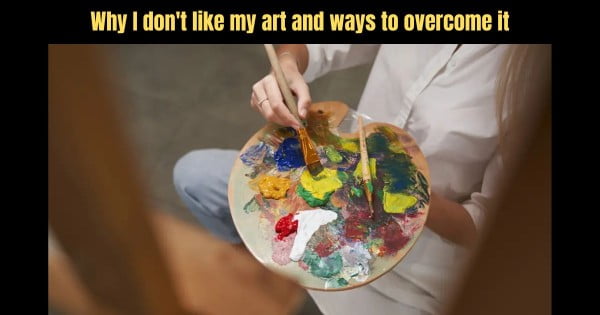As artists, we pour our souls into our work. It is a reflection of our creativity, our passion, and our innermost thoughts and emotions. However, it is common for artists to feel a sense of disappointment or dissatisfaction with their art. This article will explore why we may not like our art and provide strategies to help overcome these feelings.
The Perfectionist Mindset
One of the primary reasons why we may not like our art is the perfectionist mindset. We have a vision in our minds of what our art should look like, and when it doesn’t meet that standard, we become critical and dissatisfied. It’s important to remember that art is subjective, and others may still appreciate and enjoy what may not meet our expectations.
To overcome the perfectionist mindset, we can practice self-compassion and acknowledge that our art is a work in progress. We can also set realistic goals and focus on the process of creating rather than solely on the result.
Comparison to Others
Another reason we may not like our art is that we compare it to the work of others. We may feel that our art needs to measure up to the work of more established or experienced artists or that our style is too similar to others in our field. You can focus on our unique voice and style to overcome the comparison trap. We can seek inspiration from various sources, but ultimately, our art should reflect our own experiences and perspectives. Additionally, it’s important to remember that every artist has their journey and timeline for growth and development.
Fear of Failure
Fear of failure can also contribute to dissatisfaction with our art. We may worry that our art will be criticized or rejected or unable to live up to our expectations.
To overcome the fear of failure, we can reframe our mindset and view mistakes and setbacks as opportunities for growth and learning. We can also seek feedback and constructive criticism from trusted sources, such as other artists or mentors. Finally, we can remember that creating art is a journey; every piece is a steppingstone toward improvement and mastery. Get to know about Apa Itu Fanart.
Lack of Confidence
Finally, a lack of confidence in our abilities can also contribute to feelings of dissatisfaction with our art. We may feel that we need to be more skilled or talented to create art that we truly love.
You can focus on building our skills and knowledge through practice and learning to overcome a lack of confidence. We can also seek out supportive communities, such as artist groups or online forums, to connect with other artists and receive encouragement and feedback. Finally, we can nurture our creativity and cultivate a sense of self-expression through journaling, meditation, or other forms of self-reflection.
Reframe Your Perspective
One way to overcome disappointment in your art is to reframe your perspective. Instead of focusing solely on the end result, shift your attention to the creative process. It can help you appreciate the journey and small victories along the way. Additionally, remind yourself that every artist faces creative blocks and setbacks. Consider viewing your disappointment as an opportunity to learn and grow rather than a sign of failure. Remember, creating art is a process that takes time and practice. By shifting your perspective, you can approach your art with renewed curiosity and openness.
Experiment with New Approaches
Another way to combat disappointment in your work is to experiment with new approaches. Sometimes, we get stuck in a creative rut and must try something new to reignite our passion for art. It could mean experimenting with a new medium, style, or subject matter. You can also draw inspiration from other artists but be careful not to copy them outright. Instead, consider what you admire in their art and incorporate those elements into your unique style. Trying something new can be scary, but it can also be incredibly rewarding. You may discover a new approach you love or find that you can create piece you never thought possible.
Seek Feedback and Support
Remember that you don’t have to go through the disappointment of your art alone. Seeking feedback and support from others can be incredibly helpful in overcoming creative blocks and boosting your confidence. Contact a trusted friend or family member who can offer constructive feedback on your work. Consider joining an art group or taking a class to meet other artists who share your passion. A support system can help you stay motivated and accountable for your creative goals. However, remember that not all feedback will be positive, and knowing how to handle constructive criticism is important. Try to approach it with an open mind and a willingness to improve.



